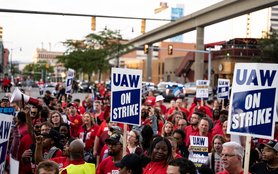For decades, power in the economy has been shifting from workers to employers—accelerated by laws and policies that discouraged unions and loosened restrictions on merging businesses. A newly proposed rule at the Federal Trade Commission is an important step to redressing the balance of power and restoring the freedom of the marketplace for working people.
Oxfam joins our allies in celebrating the fact that the Federal Trade Commission today issued a proposed rule to prohibit employers from binding their workers with noncompete clauses. This move is an important step to boost the bargaining power of working people, and to combat economic, racial, and gender inequities.
Why is this an important move?
For a labor market to be free and competitive, workers need the ability to move between jobs—for higher wages, more opportunity, better conditions. But in the US today, roughly 20 percent of all workers (30 million people) are not allowed to make this decision; they are bound by “non-compete” clauses, which block workers from taking a job with a competing employer or starting a competing business.
The Federal Trade Commission (FTC) notes the damage of these agreements to all workers as well as the economy as a whole. “They lower wages for both workers who are subject to them as well as workers who are not… [they] prevent new businesses from forming, stifling entrepreneurship, and prevent novel innovation which would otherwise occur when workers are able to broadly share their ideas.”
In fact, the impact of banning these agreements could be substantial. The FTC estimates that it could increase workers’ earnings by $250 billion to $296 billion per year; and researchers estimate that it could close racial and gender wage gaps by 3.6 to 9.1 percent.
Large employers have abused the idea of the noncompete clause for decades, using it to hold workers hostage, especially in low-wage, arduous jobs with no opportunity for exit or advancement. For example, a worker in one fast food franchise may be prohibited from leaving and finding a job at another; the employer has unfair license to maintain low wages and dangerous conditions.
As President Biden has noted, “these aren’t just high-paid executives or scientists who hold secret formulas… They’re construction workers, hotel workers, disproportionately women and women of color.”
Indeed, this move is part of a broader strategy to challenge the concentration of market power, and promote competition in the economy. In 2021, President Biden issued an Executive Order that called for abolishing noncompetes, among other measures to restore freedom in the marketplace.
How does the idea of antitrust apply to workers?
While antitrust efforts as a whole have almost exclusively focused on impacts on consumers, many economists posit that effects are more pronounced and deleterious in the labor market; in fact, one economist notes that the focus has been backwards, since, while consumers can change products easily, workers can’t change jobs easily.
The bottom line is that the increase of market concentration of employers/corporations has served to strengthen the power of employers, and weaken the power of workers. Among the impacts: decline in real wages, increase in inequality, erosion of rights to organize, loss of union/collective power, worsening of workplace conditions, and exacerbation of systemic inequities along lines gender, race, and age.
Fortunately, the last few years have seen a dramatic increase in attention from researchers, federal agencies, and the White House to address the corrosive impacts of monopoly and corporate power–in response to organizing by workers and a growing anti-monopoly movement.* Both the Obama and Biden administrations have recognized the dangers posed by the imbalance in labor market power, and have proposed a variety of measures in response. The proposed rule is a fundamental advance.
Where we win change now
This is the kind of policy action that has eluded policymaking for too long: that backs working people over corporate power. It’s important to note that, as we look for the avenues to genuine, progressive change that addresses power and the needs of working people, we need to focus on places like the FTC, as well as the Department of Labor and the Department of Justice.
As we move forward toward the 118th Congress, and likely even more gridlock between the chambers, it’s essential to understand the landscape that provides room for change—and to celebrate the activists and leaders who achieve important wins like this one.
________________________________________________________________
* The idea that the labor market is competitive was prominent in the intellectual and legal landscape until a few years ago, when it collapsed in response to several events: high tech firms and no-poaching agreements; low-wage firms and noncompete agreements (53.3% of major franchisors used no-poaching agreements in 2016, compared to 35.6% in 1996); monopsony and industry consolidations became more obvious. For more: Antitrust Remedies for Labor Market Power, Harvard Law Review, Suresh Naidu, Eric A. Posner & Glen Weyl.



